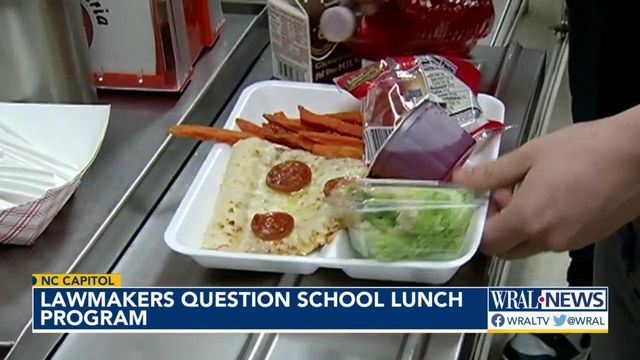Lawmakers debate whether schools should continue providing free meals to all students
Tens of millions of pandemic relief dollars have been spent to make school nutrition programs accessible to all North Carolina students.
Posted — UpdatedTens of millions of pandemic relief dollars have been spent to make school nutrition programs accessible to all North Carolina students.
Advocates say it has helped to reduce child hunger, which data shows has been a problem in this state for a long time. However, some state lawmakers questioned whether the government or schools should be responsible for ensuring children are fed – or if it should be the job of parents themselves.
During the pandemic, schools have gotten extra federal funding to supply free meals to all students, regardless of income.
Typically, to qualify for free school meals, students' families can't make more than 130% of the poverty level. For reduced price lunch, it’s 185%.
These students make up 60% of all students in North Carolina schools - that's 3 out of 5 kids. Our state ranks eighth in the nation for child hunger.
Dr. Lynn Harvey, the state school nutrition chief, says these measures have indeed helped to reduce child hunger. However, the program will end in June. She urged state lawmakers to support extending it.
"Our students deserve 'Hunger Free' schools, where all children have access to nutritious, appealing meals as part of the instructional day," she said.
Rep. Mark Brody accused Harvey of promoting government-sponsored meals, saying income is not a good way to measure hunger.
"I go visit my food banks in there, and there's a lots of food going on. Nobody's being denied anything," he argued. "The idea that kids don't have access to good food – parents just need to buy it and feed it. My mother did that to me."
Others said giving students free food sends the wrong message about self-sufficiency.
"I just think we're leading towards a socialization that takes the responsibility away from the families," said Rep. Jamie Boles.
Rep. Alexander pointed out that parents should have the responsibility at any income level for ensuring their children have food.
"Are we just sending a message that says that they're incapable of doing that and that we will just do it for them?" Alexander asked.
The committee adjourned without making a decision.
According to state data, nearly 30% of children in North Carolina live in economically distressed households and are subject to hunger or food insecurity. That's well above the national average.
Related Topics
• Credits
Copyright 2024 by Capitol Broadcasting Company. All rights reserved. This material may not be published, broadcast, rewritten or redistributed.





